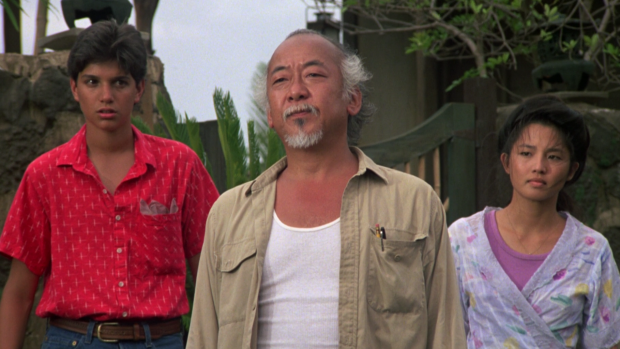Apr 8, 2020
The Karate Kid, Part II airing Thursday night on TSN
The sequel to the 1984 smash-hit, The Karate Kid, Part II - starring Ralph Macchio and Pat Morita - airs Thursday, Apr. 9 on TSN3, streaming on TSN.ca, the TSN App and TSN Direct at 8:15 p.m. ET/5:15 p.m. PT.
TSN.ca Staff

The Karate Kid was a critical and commercial smash, raking in more than $90 million at the domestic box office (nearly $250 million adjusted for inflation) and earned both Golden Globe and Academy Award nominations for Pat Morita in his role as Mr. Miyagi.
It would come as no surprise, then, that Columbia Pictures greenlighted a sequel to the 1984 smash almost immediately, with filming on The Karate Kid, Part II beginning in the fall of 1985 in time for a summer 1986 release, with director John G. Avildsen (Rocky) and its two main stars returning for the second installment.
For Ralph Macchio, who played Daniel LaRusso, a sequel represented a return to the role that made him famous. Macchio saw his star continue to rise after the release of the first film.
Macchio, who got the role of Daniel on the back of playing Johnny Cade in Francis Ford Coppola’s 1983 adaptation of S.E. Hinton’s The Outsiders alongside Tom Cruise and Matt Dillon, routinely found himself on the cover of teen magazines like Tiger Beat. His first film after The Karate Kid was also a coming-of-age story, playing a young blues musician obsessed with the story of Robert Johnson in Crossroads, a movie that featured a soundtrack by Ry Cooder. While reviews of the film were mostly favourable, it performed poorly at the box office.
A steadily working actor since the 1960s, The Karate Kid marked Morita’s highest-profile role in years and brought with it critical acclaim. Prior to the film, Morita was best known for playing Arnold, the owner of the drive-in on Happy Days, as well as a number of appearances on other television shows in which he played stereotypical Asian characters that, in retrospect, were broadly written at best and racist at worst.
With the first film wrapping up the story of Daniel’s battle with Johnny Lawrence and the Cobra Kai with his victory at the All-Valley Karate Championships (for the time being, as it is once again revisited in the YouTube Premium series, Cobra Kai, that begin in 2018 with Macchio returning, as well as Billy Zabka as Lawrence), the sequel focuses on Miyagi’s backstory and takes the pair to Okinawa Island in Japan to visit Miyagi’s dying father.
There, Daniel discovers what drove Miyagi to leave his home and travel to the United States, as well as what he left behind there. The Karate Kid, Part II introduces Miyagi’s bitter rival, Sato (Danny Kamekona) and his nephew, Chozen (Real Genius and Better Off Dead’s Yuji Okumoto), who ultimately becomes Daniel’s new nemesis.
As expected, the sequel was a smash, even beating the first film’s box office performance. The Karate Kid, Part II was the third highest-grossing film of 1986, bringing in $115 million ($282 million with inflation), behind only Top Gun and Crocodile Dundee.
Critics weren’t nearly as kind to the film, though, as they were to the original.
In the Washington Post, Paul Attansio opined that the film “becomes a parade of bogus homilies…all delivered in cadences so august as to border on the Confucian.” The New York Times’ Vincent Canby said “An air of aimless desperation hangs over Part II, which starts where the original movie left off, but seems to have forgotten what it was talking about.” Gene Siskel didn’t dislike the film, but thought there could have been more for Macchio and Morita to do. “There are scattered pleasures throughout the film due to its two lead performances, which are the equal of the work done in the original,” he wrote in the Chicago Tribune. “It’s just that with a few exceptions, the characters Miyagi and Daniel are forced into conflict with aren't worthy of their time.”
You can decide for yourself if The Karate Kid, Part II lives up to the original when it airs Thursday, Apr. 9 on TSN3, streaming on TSN.ca, the TSN App and TSN Direct at 8:15 p.m. ET/5:15 p.m. PT.
